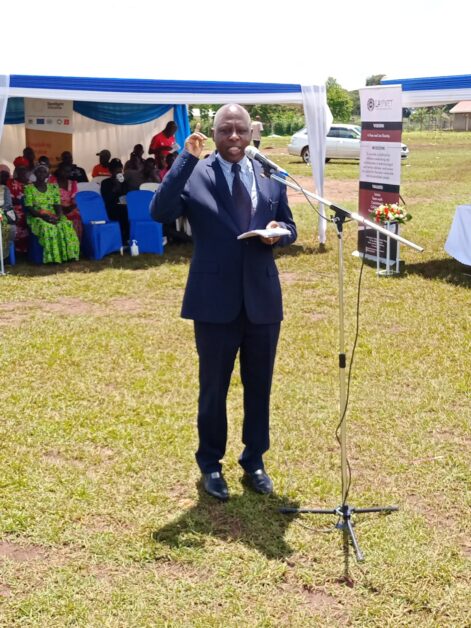Hoima High Court Judge, Byaruhanga Jesse Rugyema on Friday 8th ruled in favour of the government allowing for over UGX 950m compensation money for defiant oil Project Affected Persons (PAPs) to be deposited in court.
The court case was on Miscellaneous Cause 24 of 2023 and ensued on 4th December involving the Ministry of Energy and filed by the Attorney General on behalf of the government against 42 land occupants within Buliisa and Hoima Districts over 60 acres of disputed land that stalled the Tilenga Oil Project operations by French oil giant, Total Energies.
The ruling therefore gave a green light for the government to evict the land owners to allow for the oil project to proceed.
Court heard Friday 8th that lawyers representing the project-affected persons had objected to the idea of depositing the money in court, and instead proposed for an adjournment them to peruse through client’s files.
The judge gave the Attorney General, and the project-affected persons some time to have a common position for which they failed to agree, which resulted into a refusal to adjourn the case and ruled that the money be deposited in court.
The civil society has been up in arms over the court case indicating that the “process was rushed.”
The Africa Institute for Energy Governance indicated the Energy Ministry was seeking to evict 18 households before addressing disputes on the land that the affected households live on. Land grabbing and disputes increased in Buliisa since Total’s oil activities commenced in the district.
Dickens Kamugisha, the AFIEGO Executive Director said, “rushing the case is perhaps aimed at frustrating efforts by the affected people to get a lawyer, and to file the necessary documents before court.”
Contested land details
Court documents obtained by the CEO East Africa Magazine show the said land whose compensation totalled UGX 950 million, comprised in villages of Uduk, Avogera, Kasinyi, Kisiimo, Ngwedo centre, Kisomere, Uriibo, Kigwera, Kizingo, Kibambura, Bikongoro, Kabolwa, Serule A and Kirama in Buliisa District.
While the land in Hoima District was comprised of areas of Hanga, Kayera, Waaki, and Rwamutonga which in total measured 60 acres forming part of the land earmarked for the Tilenga Project operated by Total Energies.

In June at the handover of 105 houses to project affected persons in Buliisa District, Energy Minister Ruth Nankabirwa warned that those persons who had refused compensation would have their money deposited in court to give the right of way for the oil project to proceed.
In an affidavit sworn by Energy Ministry Permanent Secretary Irene Pauline Bateebe, court documents indicate government as part of its commitment to develop Uganda’s hydrocarbon resources and to ensure the social economic transformation of the country, granted Petroleum Production Licenses to Total Energies EP Uganda and CNOOC Uganda Ltd for the areas comprised in Exploration Area 1 and License Area 2 North of Albertine Graben constituting the Tilenga project.
The implementation of the Tilenga project requires acquisition of land comprised in Buliisa, Hoima, and Kikuube Districts measuring 2,108 acres being acquired under the Resettlement Action Plans 2, 3A, 3B, 4 & 5 by Total Energies on behalf of government.
In 2019 and 2020, the Minister of Lands, Housing and Urban Development published statutory instruments for land affected by the Tilenga project.
Due to the importance of the Tilenga project, the government opted to acquire the land through a negotiated process with the affected persons by developing and implementing Resettlement Action Plans (RAPs).
The government then carried out the valuation of the affected persons’ property, which valuation was approved by the Chief Government Valuer to facilitate payment of compensation to the project-affected persons.
Following disclosure of the compensation entitlements, 16 project-affected persons rejected the amounts as assessed by the project, and 17 project-affected persons had land ownership disputes over part of the land required for the project.
One project-affected person had despite receipt of compensation and several engagements by the government, refused to vacate the land. Since March 2021, the government has been unable to pay compensation to the other six project-affected persons as they cannot be traced despite several efforts to locate them including through community drives, consultations with local leaders, relatives and radio adverts.
On September 18 2023, the chief government valuer published a notice of intention by the government to take possession of the above land whose owners couldn’t be traced. The said persons were given 30 days within which to submit their claims.
Following engagements with the chief government valuer, the project-affected persons were served with the compensation awards but they rejected the same.
The refusal to accept compensation, non-resolution of land disputes, failure to vacate the land, and failure to locate some of the project-affected persons constrained the implementation of the Tilenga project to the detriment of the oil sector.
This therefore left the government with little choice but to request through the Attorney General’s Office to deposit the said compensation for the project to proceed.
Section 10 (4) of the Land Acquisition Act allows The High Court to order any compensation payable to be paid into court on such conditions as it thinks appropriate if it is satisfied on the application of the Attorney General that the person to whom the compensation is due is untraceable.
